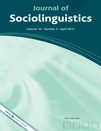
JOURNAL OF SOCIOLINGUISTICS
Scope & Guideline
Exploring the Nexus of Language and Society
Introduction
Aims and Scopes
- Sociolinguistic Variation:
The journal consistently publishes research examining linguistic variation across different social groups, highlighting how factors such as race, gender, and class influence language use. - Language and Identity:
A core area of focus is the relationship between language and identity, including how language constructs and conveys social identities, especially in multicultural and multilingual contexts. - Decolonial and Postcolonial Linguistics:
The journal has a significant emphasis on decolonial and postcolonial perspectives in linguistics, showcasing research that critiques colonial legacies in language practices and advocates for Indigenous and marginalized languages. - Multilingualism and Language Contact:
Research on multilingualism and language contact is a prominent theme, exploring how different languages interact in various social environments and the implications for identity and community. - Language Ideologies and Power:
The journal critically examines language ideologies and their connections to power structures, analyzing how language practices can reinforce or challenge social hierarchies. - Methodological Innovation:
The journal encourages innovative methodologies in sociolinguistic research, including ethnographic approaches, discourse analysis, and mixed-methods studies.
Trending and Emerging
- Trans Language Activism:
There is a notable rise in research focused on trans language activism, exploring how language can be a tool for advocacy and identity affirmation for trans communities, reflecting broader social movements for equality. - Raciolinguistics:
The concept of raciolinguistics is gaining traction, with an increasing number of studies examining the intersections of race, language, and power, particularly in contexts of discrimination and resistance. - Digital Sociolinguistics:
Emerging themes related to digital communication and its impact on language use are becoming prominent, as researchers investigate how social media shapes linguistic practices and identities in contemporary society. - Linguistic Citizenship:
A growing interest in linguistic citizenship is evident, with research exploring how language rights and practices contribute to social inclusion and belonging, especially in multilingual settings. - Climate Justice and Language:
The intersection of language and climate justice is emerging as a critical area of exploration, with studies examining how linguistic diversity can play a role in environmental advocacy and sustainability efforts.
Declining or Waning
- Traditional Dialect Studies:
There seems to be a waning interest in traditional dialect studies that focus solely on regional variations without considering broader social implications, as recent publications lean more towards intersectional and contextual analyses. - Static Language Models:
Research that employs static models of language without accounting for dynamic social contexts and changes in language use is becoming less prominent, as the journal increasingly favors studies that embrace complexity and fluidity in language. - Language and Education:
While still relevant, themes specifically centered on language education are appearing less frequently, possibly overshadowed by more pressing sociopolitical issues surrounding language and identity. - Language Change Over Time:
Studies focusing solely on historical language change, without connecting to current sociolinguistic factors or implications, seem to be declining in favor of research that emphasizes contemporary relevance.
Similar Journals

Revista de Investigacion Linguistica
Exploring the depths of language and its myriad forms.Revista de Investigacion Linguistica is a distinguished open-access journal dedicated to the exploration and advancement of linguistic research, published by the University of Murcia since its inception in 1997. With the ISSN 1139-1146 and E-ISSN 1989-4554, this journal serves as a vital resource for linguistics scholars and enthusiasts around the globe. Located in the vibrant city of Murcia, Spain, the journal aims to foster academic discourse by disseminating high-quality research that covers a broad spectrum of linguistic topics, including syntax, semantics, phonetics, and sociolinguistics. Its commitment to open access ensures that knowledge is freely available, promoting a wider reach and impact in the academic community. By contributing to the advancement of linguistic studies, the Revista de Investigacion Linguistica plays a crucial role in shaping contemporary linguistic theories and practices, making it an essential publication for researchers, professionals, and students alike.

Language Policy
Connecting Language, Culture, and Policy InsightsLanguage Policy is a prestigious journal published by Springer, dedicated to the critical examination of language policy across various sociopolitical contexts. Since its inception in 2003, it has rapidly evolved into a leading platform, currently holding a Q1 status in both Linguistics and Language and Sociology and Political Science categories as of 2023. Nestled in the Netherlands, this journal aims to foster interdisciplinary dialogue, providing insights into the intricate relationships between language, culture, and governance. With a commendable impact factor and an impressive ranking in multiple Scopus categories, it is particularly valuable for researchers and professionals seeking to explore current trends and emerging issues in language policy. The journal does not offer open access, ensuring high academic standards and curation of quality research while appealing to a broad audience of academics and industry practitioners. Explore the multifaceted world of language policy through rigorous analysis and impactful studies presented within Language Policy.
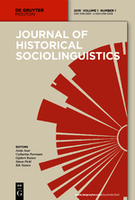
Journal of Historical Sociolinguistics
Bridging History and Sociolinguistics for Future InsightsThe Journal of Historical Sociolinguistics is a distinguished publication focusing on the intricate relationships between language and society from a historical perspective. Published by WALTER DE GRUYTER GMBH in Germany, this journal (ISSN: 2199-2894, E-ISSN: 2199-2908) is recognized for its rigorous scholarship, ranking in the Q2 quartile in Linguistics and Language (2023), highlighting its relevance and impact within the academic community. With Scopus rankings placing it at #326/1088 in Arts and Humanities and #386/1167 in Social Sciences, this journal is essential for researchers and scholars interested in the dynamics of language evolution, sociolinguistic shifts, and historical context. Through its insightful articles and contributions, the journal aims to illuminate the nuanced interplay between linguistic change and social factors over time, making it an invaluable resource for students, professionals, and academics alike. The journal operates under an open-access model, ensuring that knowledge is disseminated widely and freely accessible to those engaged in the cutting-edge studies of sociolinguistics.

Dialectologia
Fostering Global Dialogue in Linguistic ResearchDialectologia, published by the Universidad de Barcelona, Facultad de Filología, is a distinguished academic journal dedicated to the fields of linguistics and language studies. Since its inception in 2008, this Open Access journal has made significant strides in disseminating knowledge, fostering scholarly communication, and promoting research in dialectology and sociolinguistics. With its current classification in the Q3 quartile of linguistics and language, and Scopus rankings placing it in the 32nd and 29th percentiles within the Arts and Humanities and Social Sciences, respectively, Dialectologia plays a crucial role in advancing the study of language variation and change. The journal’s commitment to providing a platform for innovative research is underscored by its accessibility to a wide audience, ensuring that researchers, professionals, and students alike can engage with and contribute to contemporary discourse in language studies. Based in Barcelona, Spain, Dialectologia not only enriches academic literature but also connects a global community of language scholars through its compelling and diverse contributions.
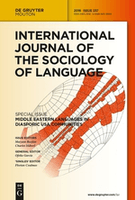
International Journal of the Sociology of Language
Exploring the Dynamics of Language and SocietyInternational Journal of the Sociology of Language (ISSN: 0165-2516, E-ISSN: 1613-3668) is a premier academic journal published by WALTER DE GRUYTER GMBH in Germany, focusing on the intricate relationship between language and society. Since its establishment in 1974, this journal has continued to serve as a vital platform for disseminating high-quality research and theoretical discussions within the realms of linguistics and social sciences. Notably, it holds an impressive Q1 ranking in Linguistics and Language and maintains robust positions in Scopus rankings, being placed in the 84th and 83rd percentiles in the Arts and Humanities and Social Sciences categories, respectively. The journal not only emphasizes the socio-linguistic aspects of language use but also aims to foster interdisciplinary dialogue, making it indispensable for researchers, practitioners, and students pursuing an understanding of language within its social contexts. Although it is not an open-access publication, its rich content and scholarly contributions continue to have a significant impact within the field, making it a recommended read for anyone interested in the sociolinguistic landscape.

Glossa-A Journal of General Linguistics
Exploring the Frontiers of Linguistic KnowledgeGlossa: A Journal of General Linguistics, published by the Open Library of Humanities, stands as a leading voice in the realm of linguistic research since its inception in 2016. With its Q1 category ranking in Linguistics and Language and impressive Scopus ranks encompassing the top 83rd and 81st percentiles in its respective fields, Glossa fosters a vibrant academic community committed to the rigorous exploration of language and linguistic theory. Operating under an open access model, the journal not only enhances the visibility of groundbreaking research but also ensures that valuable insights are accessible to a global audience. The journal's commitment to interdisciplinary dialogue makes it an indispensable resource for scholars, professionals, and students eager to engage with contemporary developments in linguistics. As it converges into 2024, Glossa continues to champion innovative scholarship and critical discourse that challenges conventional boundaries within the field.
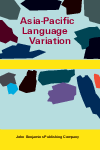
Asia-Pacific Language Variation
Fostering Interdisciplinary Insights into Language DiversityAsia-Pacific Language Variation is a prominent scholarly journal published by John Benjamins Publishing Co, dedicated to the exploration and analysis of linguistic diversity across the Asia-Pacific region. With its ISSN 2215-1354 and E-ISSN 2215-1362, the journal serves as a key resource for researchers and practitioners in the fields of linguistics and language studies. Since its inception in 2019, it has quickly ascended in stature, receiving a 2023 category quartile ranking of Q2 in Linguistics and Language and achieving impressive Scopus rankings, placing it in the 83rd percentile in Arts and Humanities and 81st in Social Sciences. Through its rigorous peer-reviewed articles, the journal aims to foster a deeper understanding of language variation, promoting interdisciplinary research and collaboration. Although it is not an open-access journal, the depth of research and critical insights offered in its pages make it an invaluable asset for academics, students, and professionals keen on the nuances of language within the dynamic Asia-Pacific context.
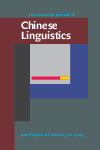
International Journal of Chinese Linguistics
Unraveling the Complexities of Chinese LanguageInternational Journal of Chinese Linguistics is a distinguished publication that delves into various aspects of linguistic studies pertaining to the Chinese language. Published by John Benjamins Publishing Co, this journal stands out for its commitment to advancing the knowledge and understanding of Chinese linguistics within the global academic community. With an impact factor that places it in the Q2 quartile of linguistics and language, the journal is indexed in prominent databases, achieving ranks of #501 in Arts and Humanities and #580 in Social Sciences. These rankings reflect the journal's dedication to maintaining high scholarly standards and its relevance in both linguistic research and practical applications. While not categorized as Open Access, the journal provides necessary access through institutional subscriptions, thereby ensuring that valuable research reaches a broad audience. Covering a wide range of topics from syntax and phonetics to sociolinguistics and applied linguistics, the International Journal of Chinese Linguistics serves as an essential resource for researchers, professionals, and students seeking to deepen their understanding of the intricate relationship between language and culture in the Chinese context. With converging years from 2019 to 2024, it continues to evolve, reflecting ongoing developments in the field.

Annual Review of Linguistics
Advancing Linguistic Insights for a Deeper UnderstandingAnnual Review of Linguistics is a premier scholarly journal dedicated to advancing the field of linguistics through comprehensive and insightful reviews of current research and emerging trends. Published by ANNUAL REVIEWS, this journal is recognized for its high impact, evidenced by its Q1 ranking in the Linguistics and Language category and exceptional placements in the Scopus Ranks, positioning it in the top 2% of its field. Since its inception in 2015, the journal has served as a vital resource for researchers, professionals, and students seeking to deepen their understanding of language theories, acquisition, processing, and sociolinguistics. With no Open Access currently available, the Annual Review of Linguistics is esteemed for its rigorous peer-reviewed articles that synthesize a wealth of knowledge, making it an indispensable tool for advancing research and dialogue within the linguistic community.

Revista de Filologia Alemana
Enhancing Knowledge Through Scholarly ExchangeRevista de Filologia Alemana, published by Universidad Complutense de Madrid, serves as a vital platform for scholarly dialogue in the fields of Linguistics and Literature. With its origins dating back to 1996, this peer-reviewed journal provides insights and critical analyses that foster a deeper understanding of German philology and its broader implications. Although categorized in Q4 across both Linguistics and Literary Theory as of 2023, the journal represents a growing contribution to academic discourse, aiming to enhance knowledge and promote research within these domains. Although it does not currently offer open access, the journal continues to attract submissions from both established scholars and emerging researchers, thereby ensuring a diverse range of perspectives. With Scopus rankings highlighting its position within the academic landscape, Revista de Filologia Alemana is essential for anyone looking to delve into the intricate relationships between language and literature.